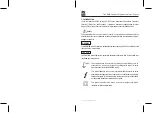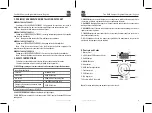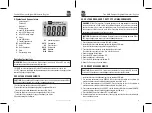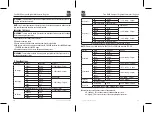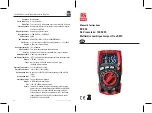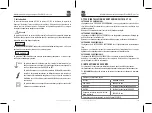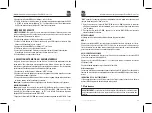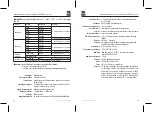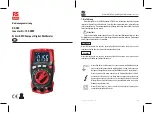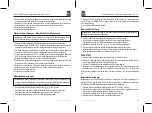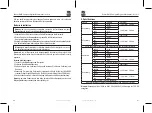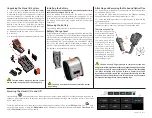
6
7
7. Touch the black test probe tip to the negative side of the circuit. Touch the red test probe
tip to the positive side of the circuit.
8. Apply power to the circuit.
9. Read the current in the display.
1. Insert the black test lead banana plug into the negative COM jack.
2. For current measurements up to 6000µA AC, set the function switch to the yellow µA
position and insert the red test lead banana plug into the µA/mA jack.
3. For current measurements up to 600mA AC, set the function switch to the yellow mA
position and insert the red test lead banana plug into the µA/mA jack.
4. For current measurements up to 20A AC, set the function switch to the yellow 10A/HZ/%
position and insert the red test lead banana plug into the 10A jack.
5. Press the MODE button to indicate “AC” on the display.
6. Remove power from the circuit under test, then open up the circuit at the point where you
wish to measure current.
7. Touch the black test probe tip to the neutral side of the circuit. Touch the red test probe tip
to the “hot” side of the circuit.
8. Apply power to the circuit.
9. Read the current in the display.
1. Set the function switch to the green
Ω CAP position.
Insert the black test lead banana plug into the negative COM jack.
Insert the red test lead banana plug into the positive Ω jack.
2. Press the MODE button to indicate “Ω” on the display.
3. Touch the test probe tips across the circuit or part under test. It is best to disconnect one
side of the part under test so the rest of the circuit will not interfere with the resistance
reading.
4. Read the resistance in the display.
WARNING: To avoid electric shock, never measure continuity on circuits or wires that
have voltage on them.
1. Set the function switch to the green
Ω CAP position.
2. Insert the black lead banana plug into the negative COM jack.
Insert the red test lead banana plug into the positive Ω jack.
3. Press the MODE button to indicate“
”and “Ω” on the display
4. Touch the test probe tips to the circuit or wire you wish to check.
5. If the resistance is less than approximately 50Ω, the audible signal will sound.
If the circuit is open, the display will indicate “OL”.
DIODE TEST
1. Set the function switch to the green
Ω CAP position.
2. Insert the black test lead banana plug into the negative COM jack and the red test lead
banana plug into the positive V jack.
3. Press the MODE button to indicate and V on the display.
4. Touch the test probes to the diode under test. Forward voltage will typically indicate 0.400
to 0.700V. Reverse voltage will indicate “OL”. Shorted devices will indicate near 0V and an
open device will indicate “OL” in both polarities.
CAPACITANCE MEASUREMENTS
1. Set the rotary function switch to the green
Ω CAP position.
2. Insert the black test lead banana plug into the negative COM jack.
Insert the red test lead banana plug into the positive V jack.
3. Press the MODE button to indicate “nF” on the display.
4. Touch the test leads to the capacitor to be tested.
5. The test may take up to 3 minutes or more for large capacitors to charge. Wait until the
readings settle before ending the test.
6. Read the capacitance value in the display
AC CURRENT (FREQUENCY, DUTY CYCLE) MEASUREMENTS
CAUTION:
Do not make 20A current measurements for longer than 30 seconds.
Exceeding 30 seconds may cause damage to the meter and/or the test leads.
RESISTANCE MEASUREMENTS
WARNING:
To avoid electric shock, disconnect power to the unit under test and
discharge all capacitors before taking any resistance measurements. Remove the
batteries and unplug the line cords.
CONTINUITY CHECK
WARNING: To avoid electric shock, disconnect power to the unit under test and
discharge all capacitors before taking any capacitance measurements. Remove the
batteries and unplug the line cords.
22/11/2017 Version No.001
22/11/2017 Version No.001
True RMS Compact Digital Multimeter / English
True RMS Compact Digital Multimeter / English
Summary of Contents for RS-960
Page 36: ...68...


